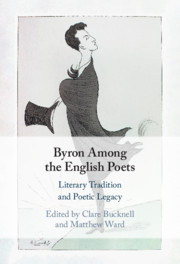Book contents
- Byron Among the English Poets
- Byron Among the English Poets
- Copyright page
- Dedication
- Contents
- Contributors
- Acknowledgements
- Abbreviations
- Introduction
- Part I Inheritances
- Part II Contemporaries
- Chapter 8 ‘I ne’er mistake you for a personal foe’: Byron and Wordsworth
- Chapter 9 The Year of Publishing Dangerously: Barbauld and Byron in 1812
- Chapter 10 Strange Designs: Byron, Shelley and Ottava Rima
- Chapter 11 Byron, Keats and the Time of Romanticism
- Chapter 12 Broken, Wild, Untold Tales: Byron’s Orientalist Poetry and Romantic-Period Narrative Verse
- Chapter 13 ‘Lord Byron, poh! the man wot writes the werses?’: John Clare, Byron and Class
- Part III Afterlives
- Index
Chapter 8 - ‘I ne’er mistake you for a personal foe’: Byron and Wordsworth
from Part II - Contemporaries
Published online by Cambridge University Press: 22 July 2021
- Byron Among the English Poets
- Byron Among the English Poets
- Copyright page
- Dedication
- Contents
- Contributors
- Acknowledgements
- Abbreviations
- Introduction
- Part I Inheritances
- Part II Contemporaries
- Chapter 8 ‘I ne’er mistake you for a personal foe’: Byron and Wordsworth
- Chapter 9 The Year of Publishing Dangerously: Barbauld and Byron in 1812
- Chapter 10 Strange Designs: Byron, Shelley and Ottava Rima
- Chapter 11 Byron, Keats and the Time of Romanticism
- Chapter 12 Broken, Wild, Untold Tales: Byron’s Orientalist Poetry and Romantic-Period Narrative Verse
- Chapter 13 ‘Lord Byron, poh! the man wot writes the werses?’: John Clare, Byron and Class
- Part III Afterlives
- Index
Summary
The polarisation of Byron and Wordsworth takes on a cartoonish tinge in the light of their poetic enmity. Byron’s bombastic lines, ‘Thou shalt believe in Milton, Dryden, Pope; / Thou shalt not set up Wordsworth, Coleridge, Southey’, claim to reject Wordsworth’s circle in favour of an earlier triumvirate.1 Readers are, only half-mockingly, asked to choose between one school and another. This stark choice often sets the tone for critical debates.2 Yet the gulf between Byron and Wordsworth, as Jane Stabler and Philip Shaw have shown, is less wide than either poet cared to admit.3 Wordsworth and Byron converge upon and diverge from markedly similar points. The epic genre, Milton and his influence, and the shaping of poetic tastes become key areas of dispute for both poets. Both claim Milton in particular for very different reasons. Milton, for Byron, is an ethical and political figure used to sponsor his own self-image, where Wordsworth’s ‘reverence for his great original’ colours both his blank verse epic and his introspective mode.4 Despite their significant similarities, however, the sense remains that the two poets set themselves up in opposition to one another, shaping and defining themselves oppositionally in their political allegiances and formal choices. While Byron dealt in public sallies against Wordsworth and the Lake School, Wordsworth’s animus against the younger poet led him to participate in and encourage what Jerome McGann has called a ‘campaign of vilification’ against Byron.5 Poetic enmity proved to be a more potent and vital form of influence than alliance as Byron and Wordsworth fought to set the taste of a nation.
- Type
- Chapter
- Information
- Byron Among the English PoetsLiterary Tradition and Poetic Legacy, pp. 131 - 144Publisher: Cambridge University PressPrint publication year: 2021

